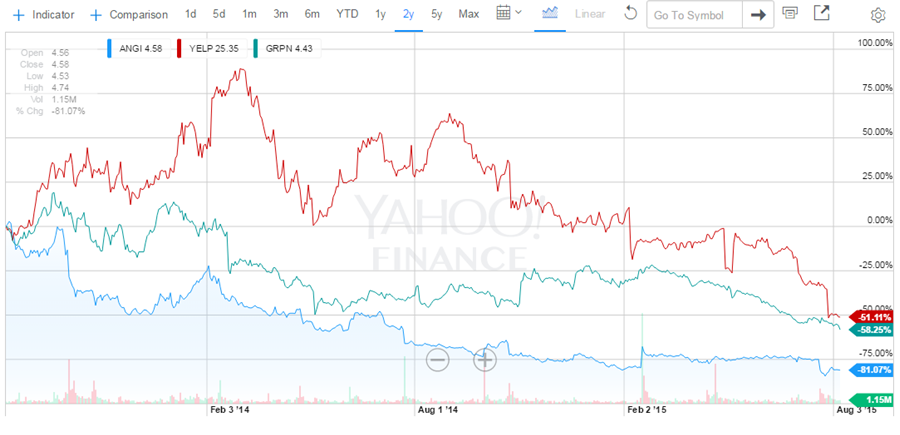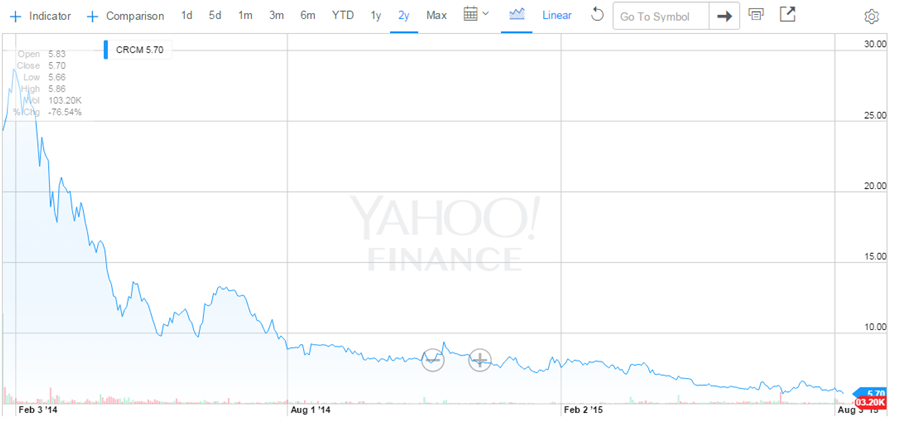Service marketplaces have recently become Silicon Valley darlings. The marketplace model has been a popular way for VCs to efficiently tap into the local economies at scale, specifically the $800 billion home services space.
It’s a model that dates back to the initial concept of Yellow Pages in 1883. And it makes sense — giving homeowners a convenient way to find local businesses around them (i.e., cleaners, handymen, babysitters, landscapers, pet sitters, etc.), while giving those same local businesses exposure to new clients.
The 1990s saw the first innovation of the marketplace model with the birth of Craigslist. But it has only been over the past 10 years that we’ve seen a major flow of investment dollars into the service space, fueling countless types of local marketplaces to pop up.
Some focus on reviews, some on discounts, some on concierge-like experiences; some offer full-service business tools. And they all typically shoot out of the gates strong — lots of press, lots of hype, lots of dollars being invested to focus on getting up to scale fast.
However, when you dig deep across all these types of platforms, you see a pattern in their behavior: Just as fast as they rise, they fall. This type of valuation behavior is seen time and time again in industries that have another commonality: no moat or barriers to entry. And the timeline between rise and fall is starting to shorten.
Liquidity Marketplaces 2.0
Companies that initially innovated the traditional marketplace model include platforms like Yelp, Angie’s List and Groupon, with unique takes on pro search and discovery for clients — peer reviews to judge quality, verified ratings to assess trust level and discounted prices for the best deals around. At the same time, they gave pros new platforms on which to advertise — from traditional paid local marketing, to ad hoc lead generation.
These three companies, in particular, collectively raised almost $1.5 billion in venture funding from 2004-2011, helping them each get up to scale as fast as possible while their marketplace offerings were uniquely relevant. At the time these companies were going public in 2011/2012, the economy was recovering, and more capital was flowing into the tech space to build scalable businesses.
As we know, disruption typically happens most quickly in sectors that are indefensible, with low barriers to entry. Coupons and local daily deals sites were all of a sudden everywhere. Locally listed pros and peer reviews soon became the norm, as opposed to something unique and special.
Increased competition and the popularity of the platform model positively impacted both clients and pros — more search and discovery options for clients, more advertising and marketing options for pros.
But for the initial marketplace innovators, any of that initial “IPO hype” fizzled after a few quarters of performance, and valuations declined from peak to trough, 70-90 percent across the board.

Of course, copycat platforms were crowding into the market, but at the same time, there were new types of models that were grabbing market share. These new entrants took a different twist on matching homeowners and pros.
Verticalized & Lead Gen Marketplaces
The most obvious derivatives of this business model were vertical-specific marketplaces of all sizes. These allowed clients to dig into a specific industry with deeper pro filters, while at the same time enabling pros to more elaborately display their profiles and work in order to make them stand out.
But there also were innovations in the user experience of discovery and lead generation. Thumbtack and HomeAdvisor (snatched up early by IAC), for example, changed up the search process altogether. Instead of homeowners spending time combing through a bunch of professional profiles, they simply submitted one-time details on which services they needed and the pros (who pay for the warm leads) reached out directly to pitch.
VC money soon came pouring in even faster for these new marketplace companies — Porch raising $65 million (Series B), Thumbtack raising $100 million (3 months after $30 million Series C) and so on. However, shortly after Thumbtack’s raise in 2014, for example, Amazon launched its Amazon Home Services platform.
Then Google announced its intension to optimize local search (via “Google Home Services”) and display profiles of local service pros above organic search results (beta currently live in specific cities and industries). This model is essentially an exact replica of Thumbtack — you can conveniently send detailed service requests to multiple pros in your area and have them all pitch to win your business.
At the same time as liquidity marketplaces were evolving, a new class of marketplace formed with the goal of controlling the client/pro transaction from end to end — the “on-demand” marketplace.
On-Demand Marketplaces
One way to preserve the stickiness and increase the defensibility of a platform is to keep the entire client/pro transaction “online” — from discovery, to scheduling, to communication, to payment — all on the platform itself.
In theory, this gives the client an even easier hiring experience (no need to even pick up the phone!), all the while, allowing the platform to charge a 20-30 percent fee per transaction in exchange for delivering business to the pro.
Companies like TaskRabbit, Homejoy and Handy were early on in the on-demand service game. One would think that heavy investment in integrated business tools could be the true differentiator within the marketplace model. Within two years these three platforms raised no less than $35 million…each. But the market didn’t react as expected.
TaskRabbit suddenly laid off significant chunks of its workforce as it struggled to hone in on the right service focus and business model. The company is still finding the right pricing model for itself and hasn’t raised in three years, which many in startup land would say is an eternity.
Homejoy officially shut down last month as the company’s model was potentially in violation of numerous labor laws, with no profitability plan in sight. And Handy, which operates an almost identical business model to Homejoy, is rumored to be churning out economics that were not unlike Homejoy, and has its own internal idiosyncratic issues. (Raising a follow-on Series B this year will give them some breathing room.)
The first on-demand home services marketplace with a “successful exit,” actually, was Care.com. The company powered through VC funding rounds and went public in 2014, peaking at about a $1 billion valuation. Since then, increased competition and platform churn has plummeted Care.com’s value by 80 percent, to just $180 million (note that the company raised more than $110 million in VC funding).

Perpetual Platform Leakage
Low technology barriers are clearly a fundamental problem within this service-pro marketplace industry. (Ironically, this is one of the main reasons why billions of dollars are being invested in the space each year — it’s relatively easy to make a quick buck and replace the older generation marketplaces and quickly grow to scale…until the next marketplace comes along to disrupt you, of course.)
However, the other core problem revolves around perpetual platform leakage. That is, these platforms are all adding a ton of value making that initial introduction between client and pro in high-quality ways.
This is especially crucial within home services since you, as a homeowner, are looking for trust and quality above all else — after all, you’re letting these pros into your home, asking them to fix or clean your most private areas, trusting them with your children, pets, etc.
But the pattern of most of these services are recurring by nature — some on a regularly occurring schedule (e.g., home cleaning, landscaping, dog walking, etc.), while others on an ad hoc basis (e.g., quick toilet fix, handy repair work, pet sitting, etc.).
Thus, there is a huge amount of activity and value taken offline once the introduction has been made, as the long tail of the client/pro relationship takes hold. Clients are perpetually motivated to move their pro relationships off platform, because it’s one less intermediary to go through to directly access the pros they love.
And for pros, the last thing they want is to have their client’s data owned by a marketplace middleman. Marketplaces have every incentive to drive clients back onto their platforms to book more professionals, book new professionals, book competing professionals and even charge for additional transactions.
The marginal utility curve of marketplace innovation appears to be flattening out as the timeline from startup to peak valuation is getting shorter, and the decline from peak to trough valuation seems to be getting sharper.































Comment